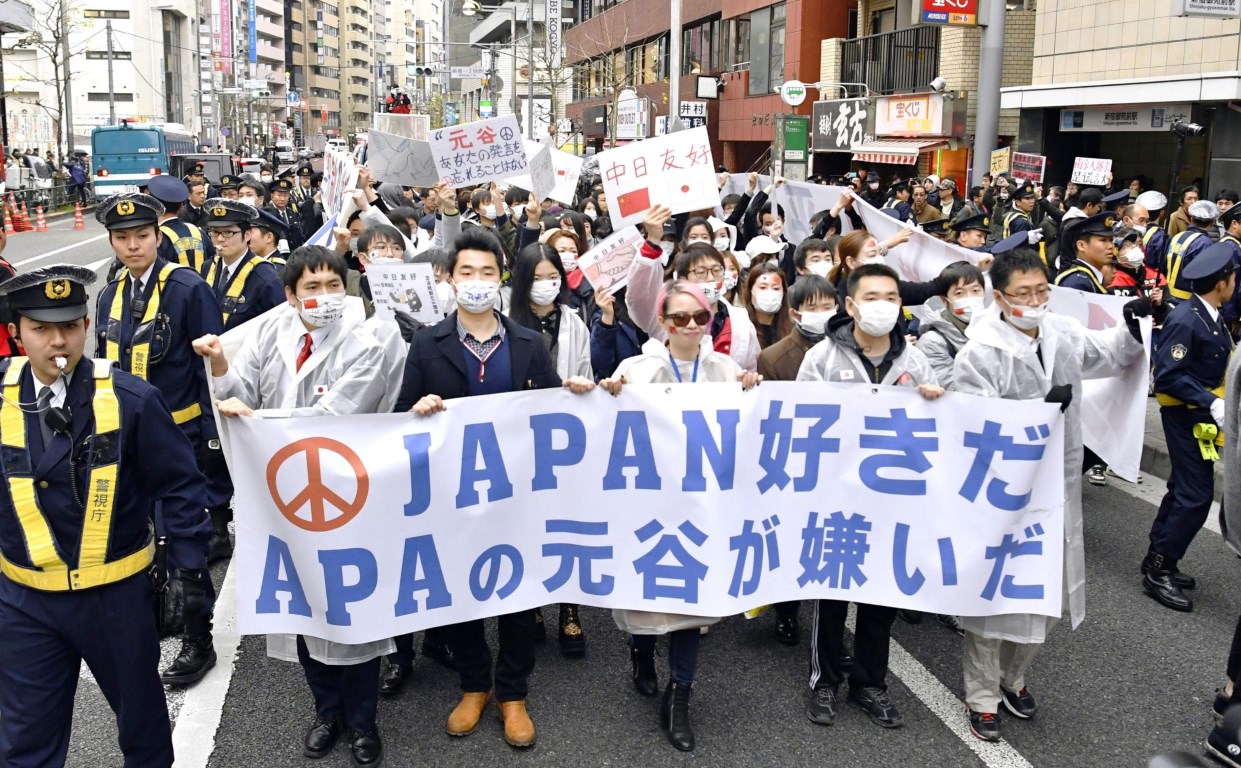Protests in Japan over nanjing
February 7, 2017 | Expert Insights

Did Japan actually commit crimes in Nanjing?
On the 5th of February 2017, Chinese protesters gathered around Japan in an outcry against the actions of the country’s largest Hotel chain, Apa Hotels. The hotel came under scrutiny for placing books in every one of their over 350 hotels containing a revised version of Japanese history. The new version is a retelling of the Massacre of Nanjing and the exploitation of South Korean ‘comfort women’; writing off the earlier insinuations as slander by China and Korea. Widespread protests broke out from the Chinese diaspora who came out in numbers over the weekend carrying banners containing slogans of "Cherish Peace" and "Resist APA resolutely and defend national dignity “.
What is the reaction from both sides?
- With over 650,000 Chinese nationals residing in Japan and over 6 million Chinese tourists visiting the nation annually, the actions of Apa could be detrimental to law and order.
- The original protests were met by reactionary protesters holding banners “Japan is a country with freedom of speech, and you should change China into the country that has the right of free speech as well."
- The owner of the chain of hotels has come out and said that he will not remove the books from the rooms despite pressure from external agencies. Japanese government officials have released a statement saying that it is well within the rights of the hotel to put whatever they want in their rooms.
- Chinese Ministry of Foreign Affairs spokeswoman Hua Chunying told a regular briefing yesterday that the incident showed some in Japan were “reluctant to look squarely at history” and warned that history shouldn’t be distorted by turning a “blind eye” to facts.
Who is behind the book’s placement and what is root cause of all the protests?
- The book itself is a creation of the Apa hotel’s founder and chairman, Toshio Motoyo who wrote the revisionist book on Japanese history under the pseudonym, Seiji Fuji.
- The book states that “these acts were all said to be committed by the Japanese Army, but this is not true.” He has come out and made statements saying that his work is a work of ‘true interpretation of Japanese history’.
- Motoyo and his wife Kimiko are known all over Japan’s as hyper-nationalists and right-wingers which makes the placement of the book of little shock to the Japanese public. Motoyo is striking a very volatile political nerve in being so forward about his revisionist views especially about Nanking.
- The massacre of Nanking took place in 1937 during the Second Sino-Japanese war. It is estimated that over 300,000 Chinese nationals were brutally murdered and raped. The contentiousness is caused by the scale of the tragedy and Japan never formally accepting responsibility. This has led to a reinvigoration of Japanese nationalism in certain sections of the population.
- PM Shinzo Abe’s government has been said to right wing and he himself receives funding from Motoyo and his ‘Anshin Kai’ group who are an advocacy group for him and helped raised money for his campaigns.
Assessment
Japan suffers a kind of nationalism very different from the type which has sprung up in the USA and Europe. Japan has neither any threats of mass immigration nor do they have threats from foreign terror. Their main reason for nationalism exhibited by Motoyo and religious organizations Nippon Kaigi is more for the rekindling of the old days of dominance and economic flourishing.
Japan has lost traction as one of the leading economic powers and is facing economic slowdown. The growing nationalism is echoed by the popularity PM Shinzo Abe.
With China and Japan being historical rivals and in recent years the tables have turned, with China now occupying the status of a near superpower. Issues like Nanking allow Japan to attack China in terms of history but do not affect the nation’s growth. Is this the beginning of another wave of new age nationalism?








Comments